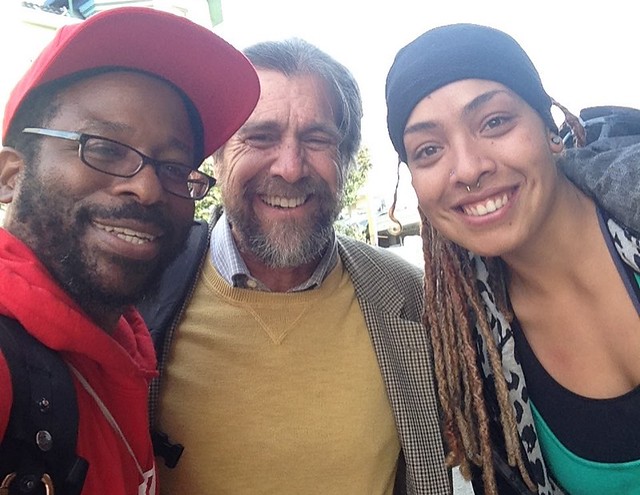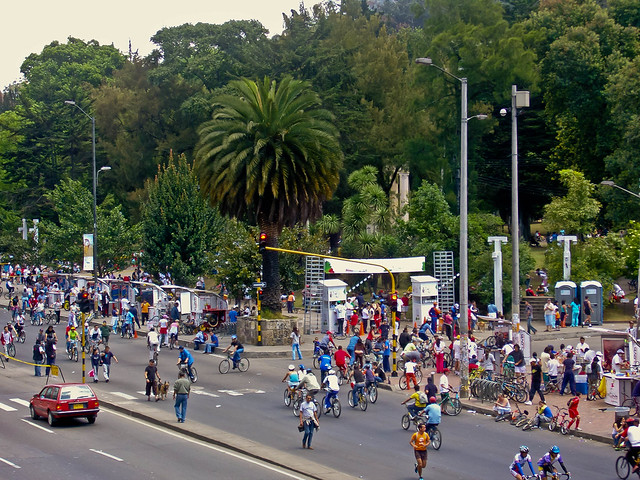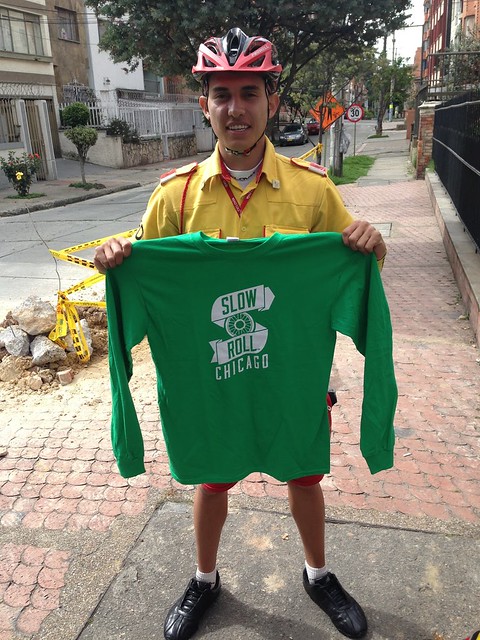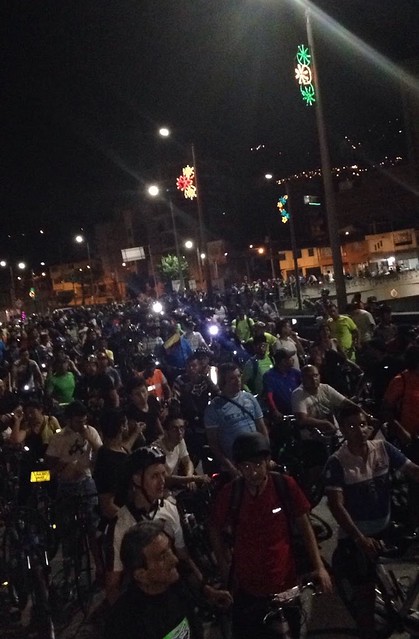Slow Roll Chicago cofounder Oboi Reed has traveled to a number of biking hotspots around the U.S. this year, to learn about how other American cities are working to promote bike equity, and talk about his group’s efforts to encourage cycling in communities of color on Chicago's South and West Sides. But his latest fact-finding journey took him further afield, to Colombia, South America, where he recently spent 11 days checking out car-free Ciclovía events and meeting with local city planners, bike advocates, and activists.
“I’ve been watching the work Colombia has done for biking from afar, and I’ve been incredibly inspired by the Ciclovía movement and had a desire to see Bogotá’s Ciclovía for myself,” he said. While organizations like the advocacy group People for Bikes have funded trips for American politicians, planners, and advocates to bike-friendly countries like the Netherlands and Denmark, Reed’s trip was paid for by Slow Roll Chicago, a nonprofit organization.
“I felt like there was too much focus in the U.S. on European cities as models for how to make American cities more livable,” Reed said. “But European cities don’t really resonate with low-to-moderate-income, black and brown people. We don’t really connect with Copenhagen or Stockholm culturally or historically, and there’s not a big presence of people of color in those cities, although there certainly is a presence.”
Reed adds that while American conversations about European-style cycling tend to focus on biking as a form of transportation, that’s not Slow Roll’s focus. “We would love that in our neighborhoods as well, but we are most interested in bicycles as a vehicle for social change, as a way to improve health, reduce violence, and create jobs. If you have no job, or you’re overweight, or you’re concerned about safety, we have to address those issues before we can convince you that bicycling is a form of transportation.”
Reed said Latin America, and particularly Colombia, has a lot the U.S. bike equity movement can learn from. “There’s a connection for our members of Latino descent, and in many countries there’s also a strong presence of African-descended people, which is the case in Colombia,” he said. “That allows us to make this social and cultural connection to biking that doesn’t really exist with these European models. And in Colombia, they’re using bicycles to address the same issues we’re working on: safety, health, and economic opportunity.”

Before the trip, Reed did research on people and organizations to connect with in Colombia. Active Transportation Alliance campaign director Jim Merrell, who travels to the country regularly with his wife to visit family, helped put Reed in touch with bike community leaders in Bogotá, the capital and largest city, and Medellín, the second-largest city. Reed also got tips from the SRAM Cycling Fund's Randy Neufeld and Gil Peñalosa, the former parks commissioner of Bogotá who helped expand the Ciclovía and now runs the Ottawa-based livable streets organization 8 80 Cities.
While in Bogotá, Reed got to ride in the local Ciclovía twice, once with Oscar Ruiz, who’s the head of the city agency who runs the event. “He told me about the nuts and bolts of how it works,” Reed said. “The events draws more than 1.5 million people every Sunday and holiday in cities around the country.”
He also rode with Jaime Ortiz Mariño, a bike advocate who organized the very first Ciclovía in 1974, when the country was in the midst of a civil war. “He was concerned that a bomb would go off during the event,” Reed said. “But one of the leftist rebels was quoted in a newspaper saying, if there’s one thing we will never touch, it’s the Ciclovía, because that represents the people.”

“The event was amazing,” Reed said. “It was incredibly diverse in terms of age, race, and economic background. It was very social, just people being outdoors and enjoying the streets without cars.” Workers and volunteers were directing traffic at intersections and doing bike repairs, and there was a police presence as well.
“On big streets, typically they only close down one side of the street for two-way bike and pedestrian traffic,” Reed said. “On the other side, often the traffic becomes two-way for cars with. Drivers were allowed to cross the route, and in some cases where there was a gas station or some major business, police would allow drivers to access that business.”
People were recreating in many different ways along the car-free route. “There were fitness classes with hundreds of people following along,” Reed said. “There was an arts and crafts fair and people selling all types of food. And there were bands and other live music.”
“Bogotá is no bicycle paradise – there’s still a need for better infrastructure,” Reed said. “But what I saw with the Ciclovía was this incredible transformation. It’s like the sun coming out. All of these people go out and enjoy the street without worrying that they’re going to get hit by cars. You add to that the feeling that this is a community experience. It allows people to relax their concerns about violence.”
“I can certainly see how the event can have a positive impact on economic activity in neighborhoods,” Reed added. “It breaks down the perception that certain neighborhoods are unsafe, and it creates jobs. It confirmed for me the importance of our work with Slow Roll. It showed me that the bicycle is one tool – we never said it’s the only one – for addressing social change. They do the Ciclovía not just to have fun, but because it makes the city more livable and safer. That’s what we should be doing in Chicago, with a focus on the communities that need these benefits the most.”
Reed was also very impressed with Medellín. “It’s a beautiful city, surrounded by mountains, with beautiful weather." He did SiCLas Medellín, a group ride that takes place every Wednesday night from 9 p.m. to 1 a.m., organized by Mauro Mesa. “There were about 2,000 people with music and lights on their bikes, yelling, screaming and whistling – it was a very high-energy ride,” Reed recalled. “A one point we were in what looked to be a low-income neighborhood, like a favela in Brazil. People were coming out and yelling and clapping and giving us high fives. It was beautiful to see.”
Reed also met with Carlos Cadena Gaitán, a university professor in urban planning, transportation researcher, and bike advocate in Medellín. “He feels the city is at a crossroads,” Reed said. “More and more people are joining the middle class. He sees the potential of a city drowning in cars, or else they can create a bicycle-friendly city.” One positive development is the local bike-share system, which has no membership fee.
In addition, Reed also met with Juan Manuel and Philip Verma at the Despacio ("Slow") community organization, which promotes the bicycle as a vehicle for social justice. “Their ethos is around slowing down life and enjoying bikes,” Reed said.
He said he came back from the journey with new ideas for pursuing Slow Roll Chicago’s mission, and he hopes to organize more such trips for SRC members in the future. “This was our first livable city study tour and an effort to explore what’s possible in our neighborhoods,” he said. “We are not going to be limited by what others say is possible in our communities. These kind of trips can give us firsthand experience that will help us figure out what our own neighborhoods can be.”
Note: Streetsblog Chicago will be on vacation next week, while editor John Greenfield does his own fact-finding trip to Mexico City. After John returns, he’ll have reports on the Metrobús bus rapid transit system (which includes a similar layout as Chicago’s Ashland BRT proposal), the local Ciclovía, and other transportation initiatives. We’ll resume publication on Monday, February 1.





